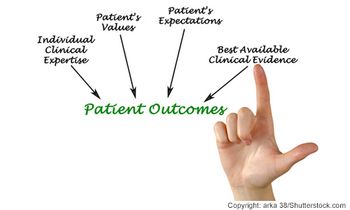
How to Thrive in a Changing Healthcare Landscape
By: Karen Coyne, CFP® These five best practices gleaned from independent doctors will help you earn more, save time, and enjoy your profession again.
There's probably never been a tougher time than right now to practice medicine.
The massive new healthcare law enacted in 2010 has created panic and complexity for many healthcare providers who already feel threatened by sinking reimbursement rates and costly administrative requirements.
But with disruption comes opportunity. In advising the independent doctors who are having success in this environment, I've observed five best practices:
1. Clarify your values.
Before you can hit a target, you have to know what you are aiming for. For instance, do you want to remain an independent practice or make a change?
A 2015
Ask yourself what you value most. Is it independence? Or is it freedom from the decisions and pressures of running a practice? Do you want to spend more time with your family?
Instead of focusing on all of the uncertainty, focus on what is certain to you, starting with your goals and values.
2. Explore your options.
Whether you choose to remain independent – or pursue employment opportunities – you have abundant options. Many successful practices are not doing business as usual; they have adapted their delivery model in some form, and will continue to explore options and opportunities that support independence while creating cost efficiencies. This can include:
• Professional services agreements
• Mega-groups
• Micropractices
• Accountable care organizations
• Independent practice associations
• Cash-only or concierge practices
• Strategic alliances
Bottom line: If independence is what you value, you can find a way to make it work.
3. Pursue efficient growth.
Almost every independent doctor I know is strapped for time. With this pressure, it's easy to become burned out – even disillusioned. You might be asking, “Will I have to work harder and harder, seeing more patients to make the same, or even less, money?” And if you're doing the same thing as you were yesterday, the answer is decidedly yes.
In the time-challenged, Affordable Care Act environment, independent practices must get creative and improve all facets of their business, taking advantage of under-utilized business tactics, including the following:
• Hire advanced practitioner (e.g. physician assistant, advanced practice registered nurses, etc.) help
• Leverage technology
• Increase patient volume
• Explore service add-ons
To survive and thrive in an post-reform law world, you must be creatively looking for ways to increase your patient base, your patient satisfaction, and the number of services you profitably offer. Successful practices are regularly reviewing outlets like these.
4. Strengthen your business acumen.
Today's challenging environment requires that you focus more than ever before on running your business. Fortunately, you don't have to go to business school to become a better entrepreneur. The first step is simply recognizing that you are, in fact, running a multi-million dollar business.
To reach your potential, seek out valuable guidance from sources such as:
• Business consultants
• Peers
• CPAs
• Financial advisers
With all that's at stake, you can't afford to go it alone on your finances – ever. You need the confidence that comes with having a professional team on your side,so that you can focus on practicing medicine.
5. Slay your money demons.
The final key to thriving in a tough environment? Overcome your personal fear factor when it comes to discussing money and business. Conversations about money issues were long considered taboo in the medical community and some of those feelings still exist today.
But successful practices are comfortable having money conversations. If you're avoiding talking about money, it's time to be honest with yourself, your spouse, your partners, and your advisers. Think of the patient who doesn't want to talk about their health issues or spend money on the office visit, medication, treatment, and so forth. Pretending issues don't exist doesn't make them better. In order to be of service to others, we also need to take care of ourselves. This is true for your patients when it comes to their health and it's true for the financial health of your practice.
Without doubt, challenges abound for today's independent medical providers. But physicians who are having success in this environment are getting out of their comfort zones, collaborating, and making changes. While there is no single magic pill, there are remedies that work.
Karen Coyne, CFP®, is the co-founder of an independent wealth management practice at Raymond James. With over 14 years of experience, she helps dentists and physicians make smart financial decisions, whether positioning a practice for growth, or preparing for retirement. She can be contacted at
Disclaimer: Raymond James is not affiliated with Kareo or Physicians Practice.
Newsletter
Optimize your practice with the Physicians Practice newsletter, offering management pearls, leadership tips, and business strategies tailored for practice administrators and physicians of any specialty.






